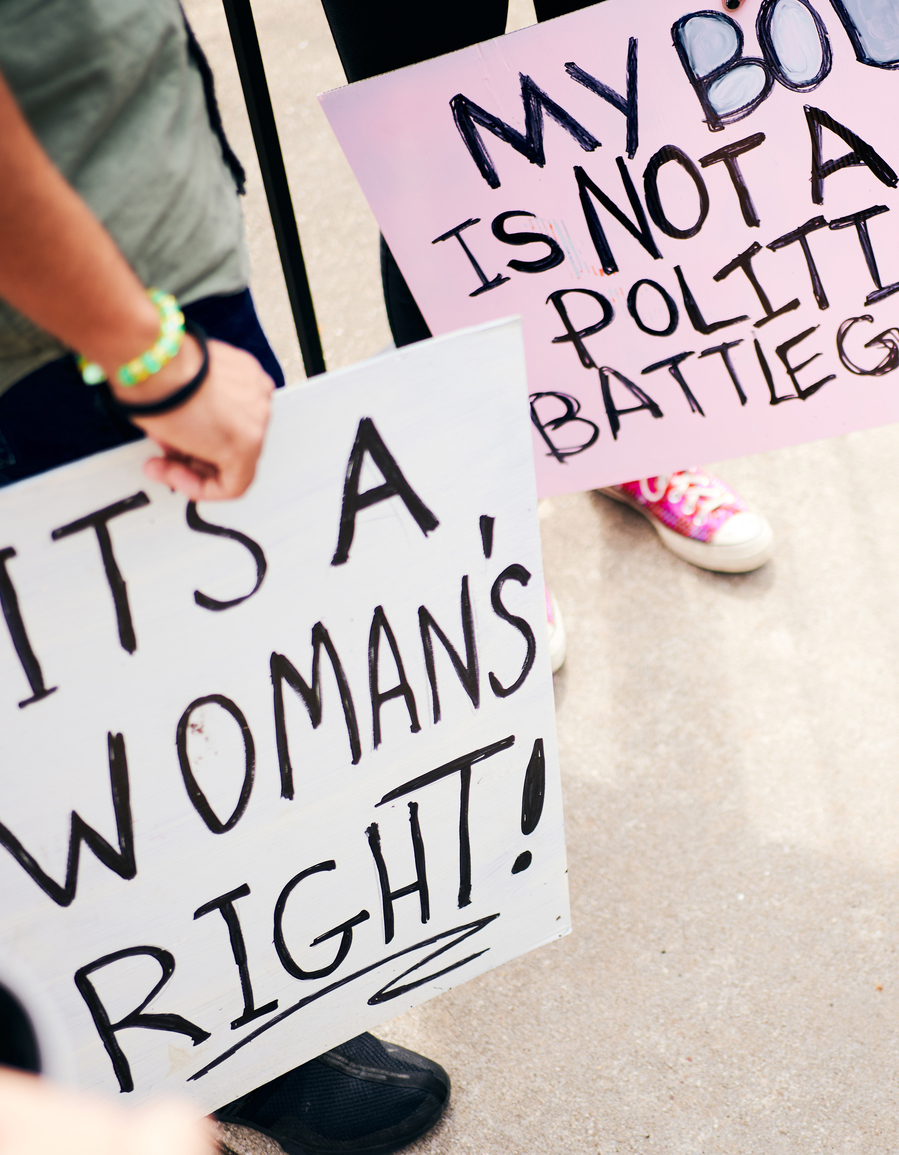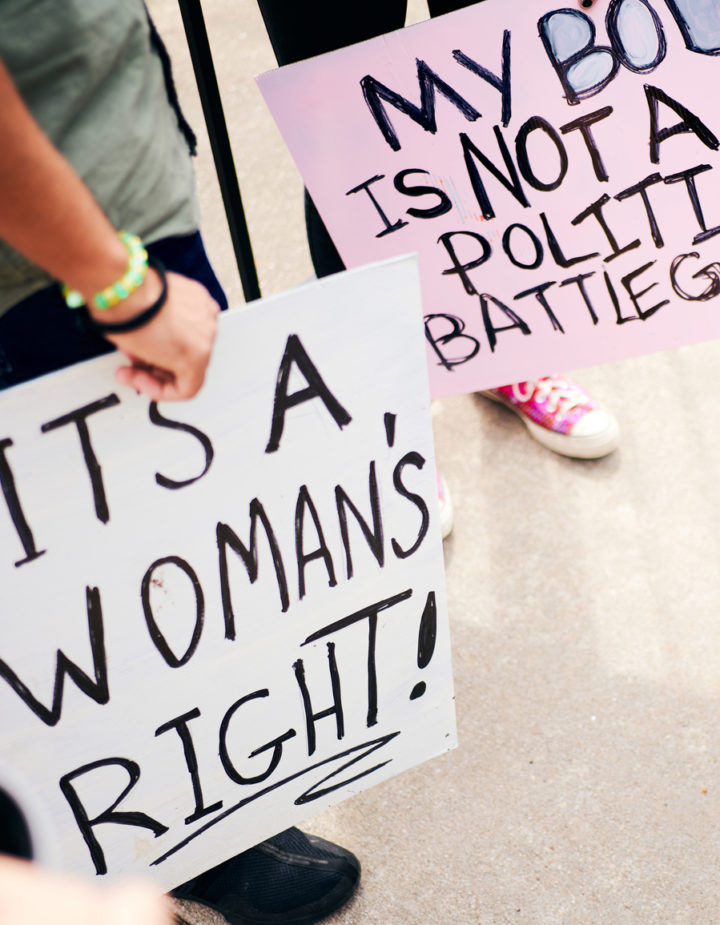Now that the unthinkable has happened – Roe v. Wade has officially been reversed by the Supreme Court – we’re starting to slowly understand the drastic chain of events it will set off across all aspects of society and our lives at large. From surrogacy options to the economy, we’re dismantling the longterm consequences of this decision across multiple areas of women’s lives.
It Will Affect the Economy by Forcing Women Out of The Workplace
Even when abortion was federally legal, new mothers have always lacked the support and infrastructure to enable them to succeed at work and at home. The pay gap plus lack of affordable childcare and lack of paid leave policy are just a few of the factors that forced women out of the workforce at higher rates than men. Today there are still 656,000 fewer women in the workforce than there were pre-pandemic, according to the National Women’s Law Center.
Now, overturning Roe v. Wade will impact women’s ability care for their future children and work at the same time. Approximately 60% of women in the U.S. who have abortions are already mothers, and approximately one-third of women seeking an abortion cite wanting to terminate the pregnancy to care for children they already have, according to a study in the Journal of Pediatrics.
It Will Affect Disabled and Marginalized People At Higher Rates
Disabled people are at high risk of being in a situation where they would need access to an abortion. According to a survey conducted by the Bureau of Justice Statistics, disabled people were over three times more likely than non-disabled people to experience sexual assault. The likelihood increases for people with multiple disabilities.
Mia Ives-Rublee, director of the Disability Justice Initiative at the Center for American Progress, said that access to abortion is crucial to the survival of disabled people because for some, carrying a pregnancy to term could put their own life in danger.
The U.S. Supreme Court’s decision also means Black and Hispanic women will bear the brunt of the decreased access to care, according to statistics analyzed by the Associated Press.
Where abortions are outlawed, those same women — often poor — will likely have the hardest time traveling to distant parts of the country to terminate pregnancies. They could end up raising children they might struggle to afford, according to Laurie Bertram Roberts, a Black woman and volunteer at Mississippi’s only abortion clinic. Roberts is also executive director of the Alabama-based Yellowhammer Fund, which provides financial support for women seeking abortions.
It Will Affect IVF Offerings
The Supreme Court’s decision has raised fears that it could have “far-reaching ramifications” on people looking to get pregnant and the clinics providing services to help them. Experts have previously told CNN that a high court ruling could open up the legal terrain for states to interfere with IVF. Fertility doctors and academics who study the legal landscape around fertility told CNN there is uncertainty — both about how abortion laws already on the books will be interpreted and about how lawmakers and local prosecutors may seek to push the envelope. They fear the lack of clarity will affect the treatments doctors are willing to offer IVF patients and the decisions people will have to make about how to pursue growing their families.
It Will Affect the Surrogacy Industry
According to the International Fertility Law Group, in surrogacy arrangements, “intended parents, the surrogate and her husband and family agree in a written contract what measures will be taken in specific circumstances.” That means that both parties might agree that, if the surrogate became pregnant with multiple embryos, the number would or could be reduced. For instance, as in the case of fetal abnormality or disease, the parties might agree to terminate the pregnancy.
Now with Roe overturned, a surrogate who lived in a state where abortion was banned would be forced to travel to another state where the procedure is allowed. Some state legislators already have advanced plans to prevent women from traveling from a state. Roe’s overturn may result in a decline in surrogacy in anti-abortion states and an increased demand for surrogates in pro-choice states.
It Will Affect Abortion Training and the Future Of Reproductive Health
According to the Association of American Medical Colleges, overturning Roe v. Wade will make it harder for future OB-GYNs and other providers to learn to perform abortions. It will also affect other forms of medical training, including miscarriage management, counseling patients, and emergency care.
“The widespread criminalization of an aspect of health care and the effect we expect on medical education is unprecedented,” says Scott Sullivan, MD, a spokesperson for the American College of Obstetricians and Gynecologists (ACOG), the country’s largest OB-GYN professional organization.
The academy predicts it will also have a profound impact on the education of tens of thousands of medical trainees, among them OB-GYN residents who are required to learn abortion-related procedures such as those done after miscarriage.
It Will Hurt Women and Babies
One of the most immediate impacts Roe v. Wade will have on women’s health is maternal health, especially considering that the United States already has one of the highest maternal mortality rates in the developed world, according to Dr. Ana Langer, director of the Women and Health Initiative and a professor of public health at the Harvard T.H. Chan School of Public Health.
According to the Centers for Disease Control and Prevention (CDC), around 700 women die each year due to pregnancy or delivery complications within the first year after giving birth in the U.S., which continues to have the highest maternal mortality rate among developed nations.
Public-health researchers and economists submitted evidence to the Supreme Court ahead of the case showing that restricting abortion access has negative consequences for pregnant people, who are at increased risk of physical and mental-health issues when they are denied an abortion, and for infant health. “We know from other severe restrictions in states like Texas what happens when abortion access is curtailed,” says Liza Fuentes, a senior research scientist at the Guttmacher Institute.
Another potential consequence of restricting access to abortion is that people might try to end their pregnancies without clinical supervision. Some are likely to do this with abortion medications, which are safe and effective, according to the World Health Organization.


